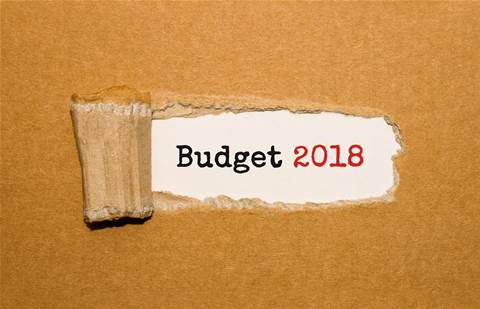The Federal Government has announced a swathe of spending on IT and technology infrastructure, as well as tax cuts for small businesses and tightened regulation of offshore taxation.
Handed down by treasurer Scott Morrison on the evening of Tuesday, 8 May the budget outlined the government's plan, among others, to spend $2.4 billion on Australia's "public technology infrastructure".
"This includes supercomputers, world-class satellite imagery, more accurate GPS across Australia, upgrading the Bureau of Meteorology's technology platform, a national space agency and leading research in artificial intelligence," Morrison said in his Budget 2018 speech.
The government also said it would legislate tax cuts for all businesses, but prioritising SMBs, delivering infrastructure that supports industries and jobs and targeting incentives to promote research development and new strategy. The budget also outlined greater investment in research, science and technology jobs.
The tech spend
The tech spend includes $1.9 billion in funding toward Australia’s "research infrastructure", which includes a $140 million injection into supercomputing to "advance medical research, nanotechnology, mining, construction and urban planning with high‑speed calculations", according to the budget.
The $140 million will be spent on upgrading two supercomputers, housed at the Pawsey Supercomputing Centre in Perth and the National Computational Infrastructure facility at the Australian National University in Canberra.
Research across biomedtech programs will be bolstered by $94.3 million, which will be used to increase biomedical research and better integrate Australian researchers with the industry. A further $30 million will be spent to improve data sharing capabilities, including better access to data by researchers, of the Australian Institute of Health and Welfare.
The government also announced a $225 million investment to "significantly improve the accuracy and availability of satellite positioning across Australia, enhancing our use of GPS to benefit agriculture, construction and logistics industries".
A further $41 million will be spent to establish a national space agency in a bid to grow the industry and capture a slice of the annual US$340 billion global space industry. The budget documents noted that a $15 million international space investment would provide grants to space projects that created employment opportunities for Aussies.
The Bureau of Meteorology will receive an undisclosed amount of funding to improve the security and resilience of its IT systems, while the Department of Home Affairs will receive an ICT systems upgrade to the tune of $130 million for visa processing, identity management and threat analysis.
An investment of $29.9 million will be put toward growing Australian capabilities in AI and machine learning. The spending will including planning toward improving expertise in these areas along a "technology roadmap", guided by a new ethics and standards framework.
Funding of $10.1 million over three years will be provided to digitise important and currently paper workflows at the Australian Pesticides and Veterinary Medicines Authority.
$106 million over four years will be spent to modernise the systems and IT infrastructure that support the delivery of Medicare, the Pharmaceutical Benefits Scheme, aged care and related payments.
A sum of $316 million will be spent over four years from 2018-19 to continue to upgrade Centrelink's legacy platform and "streamline the delivery of welfare payments".
The Department of Veterans Affairs will upgrade its ageing IT systems using some of the $111.9 million committed to improving services for veterans across the country.
Elsewhere, the budget noted $50.1 million would be spent on upgrading security screening technologies at 64 regional airports, and a further $122 million would be spent to enhance screening technology for inbound air cargo.
You can check out the full list of IT projects at iTnews.
Small business and the startup scene
The budget has handed down that the government intends to bump up the unincorporated small business tax discount rate from 5 percent to 8 percent, up to a cap of $1000, with the rate increasing to 16 percent by 2026-27.
"The small business entity turnover threshold has also been lifted from $2 million to $10 million, which has extended access to a range of small business tax concessions," the Budget read.
The Research and Development Tax Incentive (R&DTI), will also be reformed following a review in 2016, as well as a more IT-focused review last year, that will see its focus "sharpened" on eligible business R&D. Additional resources will be put toward ensuring ineligible claims are denied, and greater transparency around who is claiming the incentive will be introduced.
The Government said it would also support the growth of the fintech sector in Australia with a $100,000 investment to promote Australia as a financial technology destination, though funding for this will come from existing treasury department resources.
In looking at tax structures in the digital era, the government said it was committed to ensuring digital businesses paid their fair share of tax in Australia.
"Building on the success of the [Multinational Anti-Avoidance Law] and the [Diverted Profits Tax], the government has introduced further measures to ensure that businesses are paying their fair share of tax," the report read.
These new measures include government action to strengthen "thin capitalisation rules" that prevent companies shifting profits offshore, and broadening the scope of multinationals subject to the MAAL and DPT.
Offshore digital businesses organising bookings for Australian hotels will also face the same tax treatment as Australian businesses.
The Budget didn't speak much to National Broadband Network, apart from to reiterate that it would be about 75 percent complete by the end of 2018 and was on track to be completed by 2020.
The full 2018 Budget can be found here.




.jpg&h=142&w=230&c=1&s=1)








.jpg&w=100&c=1&s=0)











